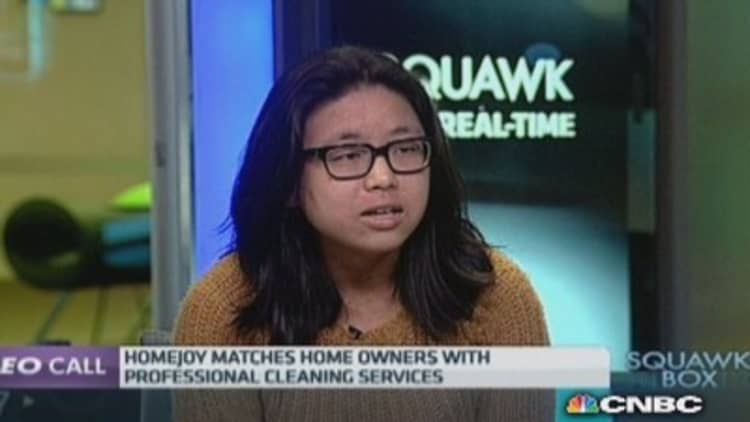
The virtual world is already taking up a large chunk of our days – governing how we communicate, navigate and play games and music – but what about the more mundane parts of our lives such as cleaning behind the fridge and finding a lost pair of keys?
U.S. start-up HomeJoy – a website that helps people book a cleaner – launched in the U.K. this week off the back of rapid growth in the U.S. It has already received $38 million in venture capital investment, led by Google Ventures and Redpoint Ventures.
HomeJoy, which currently operates in over 30 cities in North America, is not the first start-up focusing on chores that has received interest from investors.
TaskRabbit is a U.S. website that allows individuals to outsource small jobs and tasks to other people in their neighbourhood. The site also came to London in November 2013 after it operating in 19 U.S. cities and has received $37.7 million in venture capital funding.
The Freedonia Group, a market research company, estimated that by 2016, the U.S. residential cleaning services market will increase to $14.3 billion, up from $11.2 billion in 2011.
According to Britain's Office of National Statistics, the U.K. cleaning industry, both domestic and industrial, had a turnover of £4.7 billion in 2012.
The world of cleanings, chores and tasks is clearly now entering the realm of on-demand ordering. HomeJoy's co-founder and CEO, Adora Cheung, told CNBC you can now book a cleaner within 60 seconds.
Read More Kids hate doing chores? There's an app for that
HomeJoy and TaskRabbit models
While Homejoy focuses on cleaning service, TaskRabbit's Head of Marketing, Jamie Viggiano, told CNBC that users can request a "Tasker" for any type of chore.
"We had somebody scuba dive in Chicago," Viggiano said. "Somebody lost their keys in a river and they hired a tasker to scuba dive and find the keys. They found the keys."
Adora Cheung set the company up with her brother, Aaron, after he tried to find someone to clear his bachelor pad of its mess.
"You had two choices: either you can get a trusted cleaner who knows how to clean so you go to an agency but they're expensive. Or you can go to online classifieds like Craigslist, which is more affordable, but you don't know who's going to show up," she explained.
For its U.K. service, HomeJoy said it was adding dozens of cleaners each week and did not have a precise number of workers yet. It charges £13 ($21) per hour per job, with the cleaner – who is a contractor – receiving up to £9.50 ($16). The National Minimum Wage in the U.K. is currently £6.31 ($10.59). In the U.S., HomeJoy cleaners receive $15 per hour.
Read More The couple that pays each other to put kids to bed
TaskRabbit currently has 75 Taskers available in the U.K.'s capital. "Most fall in the £18-£20 ($30-$33) range so these folks are making a fair wage," Viggiano said. "In the U.S. we've been very cognisant about the minimum wage and we set a bar where nobody can make below $14 per hour."
Both HomeJoy and TaskRabbit have rigorous vetting processes (background checks, in-person interviews) but they have different people come forward to work. HomeJoy attracts either full-time cleaners or stay-at-home moms who like the flexibility the service allows them: cleaners indicate to HomeJoy the hours and areas where they want to work.
According to Viggiano, 80 percent of Taskers have bachelor's degrees while 20 percent have a master's or higher. "These are highly-skilled, highly-trained, high-quality people who can help with the task," she told CNBC.
TaskRabbit has come came under criticism in the U.S. after Taskers complained of having no insurance as well as being paid less than minimum wage to do difficult and sometimes dangerous tasks. Plus, because Taskers compete with others to win assignments, prices for a task can drop.
Spokesperson Johnny Brackett told CNBC: "We are constantly pushing out new updates that benefit our TaskRabbits. Their safety, security and comfort are our utmost concern…Taskers set their own hourly rate, so they will never be paid less than what they set as their wage." TaskRabbit now insures each and every task up to $1 million.
The new economy
With so many Taskers having highly-educated backgrounds, it is an indication of the state of the job market that an Ivy League grad might have to scuba dive in the Chicago River to pay their rent.
The two services illustrate what a key themed outlined by economic theorist Jeremy Rifkin outlines in his new book "The Zero Marginal Cost Society: The Internet Of Things, The Collaborative Commons, And The Eclipse Of Capitalism." Goods and services can now be created for free, he argues, and millions of people are now moving their skills and lives from capitalist markets to "emerging global collaborative commons."
Read More A wave of start-ups helps small companies outsource their tasks
Robert Kuttner, the co-editor of The American Prospect magazine and a distinguished senior fellow of think tank Demos, argued that "The Task Rabbit Economy" was creating an environment of"ever more casual employment" that favors flexibility and makes workers lose out on traditional benefits.
Cheung argued that HomeJoy was simply a means to ensure easier employment for cleaners rather than a way of getting cheap work for over-qualified individuals.
"There are obviously less opportunities in a bad economy,but I think HomeJoy is a different kind of thing because we work with professional cleaners versus these other places, where you can't get a job coding so you have to get a job outside of your skillset," she said.
"The people who work with us, they want to clean. But they don't want a full-time job doing it -- they just want flexible hours."

